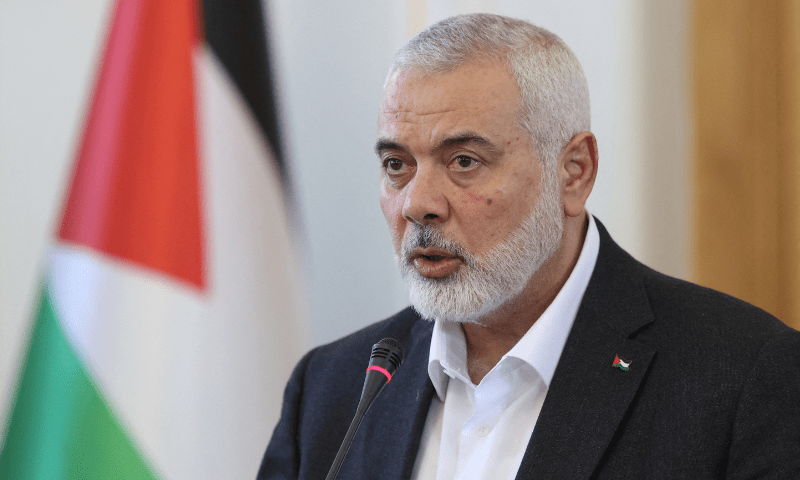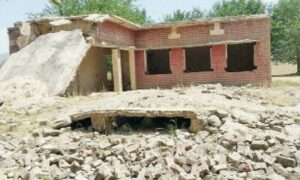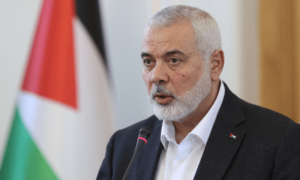Haniyeh’s assassination has the potential to significantly alter the Middle East’s geopolitical landscape.
The assassination of Ismail Haniyeh, a senior Hamas official, in Tehran on Wednesday morning will have significant ramifications for Iran, Israel, Gaza, and the broader Middle East.
Haniyeh was a prominent figure in Palestinian group Hamas, serving as the head of its political bureau, in which role he was crucial in shaping the group’s strategy and policies. As a man whose family was kicked out of their home in 1948, Haniyeh’s leadership and understanding of the Palestinian cause was vital for maintaining the organisation’s influence in Gaza and its relationships with other members of the Iran-backed network known as the Axis of Resistance. His position allowed him to coordinate efforts against Israel and manage political relations with regional allies, making his assassination a significant blow to Hamas.
What we know about the assassination
Haniyeh was visiting Tehran to attend the inauguration of President Masoud Pezeshkian when a projectile struck his accommodation at 2:00am, killing him and one of his guards. Details about the projectile and how it was able to evade Iranian air defences and security measures remain scant.
Iranian, Palestinian, and other Axis of Resistance officials all agree this was an Israeli operation. The latter has, however, not claimed the attack yet.
Nevertheless, if it is indeed Israel’s doing, the choice to assassinate Haniyeh in Tehran, instead of other capitals he frequented such as Doha and Beirut, suggests a bold statement from Israel, aimed at both the Palestinians and the Iranians. It also highlights Israel’s reach and challenge to Iranian security.
While Hamas’s vow of retribution was expected, the reaction from Iran carries significant repercussions. Iran’s Supreme Leader Ayatollah Ali Khamenei called Israel a “criminal Zionist regime,” stating that “severe punishment” was a “duty”, while emphasising that “the blood of Haniyeh, shed on Iranian soil, will not be in vain.” This is as close to a direct call for a military response as one has ever heard from Khamenei. It also underscores Iran’s desire to prove the strength of its defences and homeland security, as well as affirm its role in the Axis of Resistance.
This event has also put the new reformist President Pezeshkian under immense pressure to act swiftly to prove his pro-Iran credentials, as it happened literally on his first day in office. Conservative Iranians, in particular, will hold him to account for what he does next.
Meanwhile, Qatar’s Foreign Minister, Mohammed bin Abdulrahman Al Thani, condemned the assassination and criticised Israel for undermining peace talks through violent actions. He pointed out that such acts make mediation impossible, suggesting that Israel’s approach is detrimental to achieving any diplomatic resolution. This condemnation highlights the severe impact on diplomatic efforts, as Qatar’s role as a mediator is critical. A hardened stance from Qatar could significantly reduce the chances of a peaceful resolution.
Impact on the conflict and negotiations
As pointed out above, Haniyeh’s assassination has the potential to significantly alter the Middle East’s geopolitical landscape. Iran views this as an attack on its sovereignty, which could lead to increased military activity and retaliatory attacks from its proxies, including Hamas, Hezbollah, the Houthis, and other Iran-aligned pro-Palestinian groups across the region. The nature of Iran’s direct response will be pivotal in determining whether the situation escalates into a broader conflict. This incident could solidify the Axis of Resistance and prompt coordinated responses, increasing regional instability.
In Israel, the assassination will embolden right-wing factions, who will see the successful assassination as a green light to be even more provocative, using retaliation as impetus to increase aggression. Prime Minister Benjamin Netanyahu, already under pressure due to corruption scandals, finds himself in a corner, being pushed to increase military action, while scuttling any chances for peace. This internal political pressure could lead to decisions that may engulf the whole region in conflict.
For Palestinians, Haniyeh’s assassination will serve as a unifying factor, especially following the recent reconciliation between Hamas and Fatah. A unified Palestinian leadership is better positioned to respond to the conflict and address the needs of Palestinians in Gaza and the occupied territories — something the lame-duck leadership of Mahmoud Abbas has been unable to achieve. This unity could strengthen Palestinian resistance efforts but also complicate peace negotiations, as a more unified Palestinian front will speak from a stronger position and reflect that in its demands and hardened positions.
Tehran’s security breach: Implications and legal concerns
Without a doubt, the precision of the attack raises questions about the failure of Iranian security, especially during a high-profile event. Some keyboard warriors are speculating this was an inside job, though there is no evidence to support these claims. Regardless of pro-establishment voices who’ve asked Iranians not to doubt the strength of their security capabilities, public pressure and criticism will compel Tehran to react decisively, both to prove its capability and to restore confidence in its security apparatus.
Furthermore, the assassination of a political leader in a foreign country violates international norms. According to Article 2(4) of the United Nations Charter, “All Members shall refrain in their international relations from the threat or use of force against the territorial integrity or political independence of any state.”
This assassination raises significant legal and ethical questions, challenging these principles of sovereignty and non-intervention. By targeting Haniyeh on Iranian soil, the Israelis seem to have committed an act of aggression, setting a dangerous precedent. Such actions erode the integrity of international relations, undermine global legal frameworks, and open the door for a never-ending and vicious circle of tit-for-tat retaliations, which could spiral out of control.
What next
The assassination of Haniyeh in Tehran has far-reaching implications for regional stability and conflict dynamics. The responses from all stakeholders highlight the potential for increased violence and destabilisation.
As seen in previous cases of assassinations of Iranian officials and nuclear scientists, Tehran’s response has been calculated. While it is easy to get caught up in the criticism that Iran is weak, this would be a mistake and misreading of the situation.
Just because the Iranian establishment has chosen not to react to the detriment of regional stability so far, doesn’t mean it doesn’t have the capability to strike Israel in devastating ways. Once again, the world waits with bated breath to see how Tehran will respond, and what this means for the ongoing conflict and peace negotiations in the region.
Header image: Palestinian group Hamas’ top leader Ismail Haniyeh speaks during a press conference in Tehran, Iran on March 26, 2024. — Wana via Reuters/File







